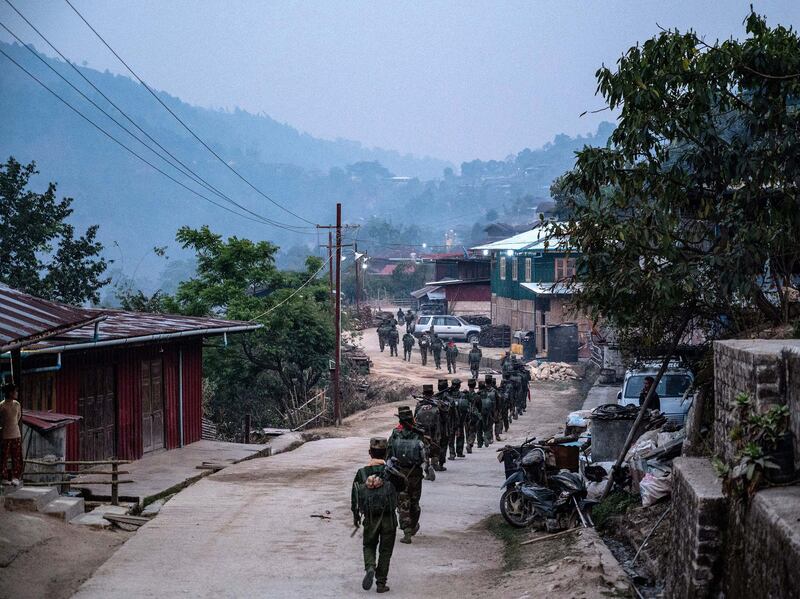Read RFA coverage of this topic in Burmese.
Ethnic Ta’ang rebels have renewed their vow to crush Myanmar’s ruling junta, but said that a ceasefire offer made in November following pressure from neighboring China remains on the table.
Based in the northeastern state of Shan, the Ta’ang National Liberation Army, or TNLA, has been fighting for autonomy for years. It is a member of the Three Brotherhood Alliance of ethnic armies that went on the offensive against the junta on Oct. 27, 2023, and made stunning gains.
It now controls 11 cities and towns, including the country’s largest ruby mine town of Mogoke in the Mandalay region.
Observers told RFA Burmese that the pledge, made in a Sunday statement marking the 62nd anniversary of Ta’ang National Revolution Day, suggests that the TNLA realizes it cannot achieve peace unilaterally and that merely controlling its own region would be unsustainable if the junta remains in power.
TNLA spokeswoman Lway Yay Oo told RFA that the statement, which also called for increased cooperation with other rebel forces, was released in line with the group’s goal of removing the junta, which seized power in a February 2021 coup d’etat.
“Although the military dictatorship has been eliminated in the Ta’ang region, the regime continues to exist throughout Myanmar,” she said. “Since the dictatorship is still in power, we will continue to fight to achieve our revolutionary objective of removing the dictatorship.”
Lway Yay Oo said that the TNLA is adhering to its ceasefire offer to the junta “in consideration of the safety of the local people.”

Lt. Gen. Tar Aik Bong, the chairman of the Palaung State Liberation Front - Ta’ang National Liberation Army, or PSLF-TNLA, which is also fighting for self-determination in Shan state, said his group would intensify military operations this year in cooperation with other anti-junta forces in the plains and surrounding areas.
In a speech marking Ta’ang National Revolution Day, he also called for strengthened unity among opposition groups to overthrow the junta in 2025, following victories last year.
Two-pronged approach
Despite the TNLA’s self-assured statement, political commentator Hla Kyaw Zaw told RFA that the group likely issued it due to the ongoing threat of a military attack.
“They [the TNLA] proposed peace negotiations under pressure from China, but peace cannot be achieved unilaterally,” he said. “Therefore, they have expressed a dual approach of engaging in peace dialogue with one hand while vowing to remove the junta with the other.”
China has managed to broker short-lived ceasefires between the insurgent allies and the military before, but they collapsed.
Beijing has extensive economic interests in Myanmar, including energy pipelines and mining projects and is keen to see an end to the violent turmoil that has engulfed its southern neighbor since the coup.
Hla Kyaw Zaw said that the TNLA’s statement suggests the group understands that simply controlling its own region is unsustainable.
“If the military regime remains intact, it will regroup and resume its offensive campaigns, just as it did during the terms of [earlier juntas],” he said. “They’ve learned from past experience that while the junta may agree to peace in one region, it simultaneously launches attacks in others. This is why the TNLA issued its recent statement.”
RELATED STORIES
Junta forces are mobilizing in central Myanmar amid Shan state ceasefire, rebel say
Myanmar military presses offensive after two groups agree to talk
Myanmar insurgents call ceasefire after Chinese pressure for peace
Former military officer Capt. Zin Yaw, who now advises rebel forces as part of the Civil Disobedience Movement of state employees who left their jobs to protest the military’s coup, said that the TNLA’s pledge to cooperate with other anti-junta forces suggests that fighting will intensify in Mandalay and Sagaing regions, as well as southern Shan state.
“The TNLA has clearly stated that the junta can only be removed if all rebel forces fight collaboratively, while also considering political dialogue as an alternative option,” he said. “I anticipate that rebel forces in northern Shan, southern Shan, Sagaing, and Mandalay will grow stronger and achieve more victories.”
Threat of airstrikes
A resident of Lashio, the largest town in Shan, told RFA that the statement has raised concerns that the military may carry out airstrikes on areas in the northern part of the state.
“Bombings and fighting since the coup have been common for residents, but we worry about further bombings and attacks,” said the resident, who spoke on condition of anonymity due to security concerns. “We hope to enjoy peace one day. However, we can do nothing but endure because we cannot stop the conflict.”
Junta chief Senior Gen. Min Aung Hlaing has repeatedly expressed interest in peace talks since his visit to China last November, as have the members of the Northern Brotherhood Alliance, which also includes the Arakan Army, or AA, and the Kokang Army, or MNDAA.
However, the various sides have yet to hold talks, said the TNLA’s Lway Yay Oo.

A former military officer and political commentator, who also declined to be named, said he believes the TNLA’s call to resume the fight against the military is intended to consolidate aligned anti-junta forces.
“If they stop fighting now, their internal unity could be undermined,” he said.
But the group also faces challenges “due to a lack of economic resources.”
“This is why they are saying two different things,” he said.
Attempts by RFA to reach junta spokesperson Maj. Gen. Zaw Min Htun for comment on the TNLA’s statement went unanswered Monday.
Translated by Aung Naing. Edited by Joshua Lipes and Malcolm Foster.
